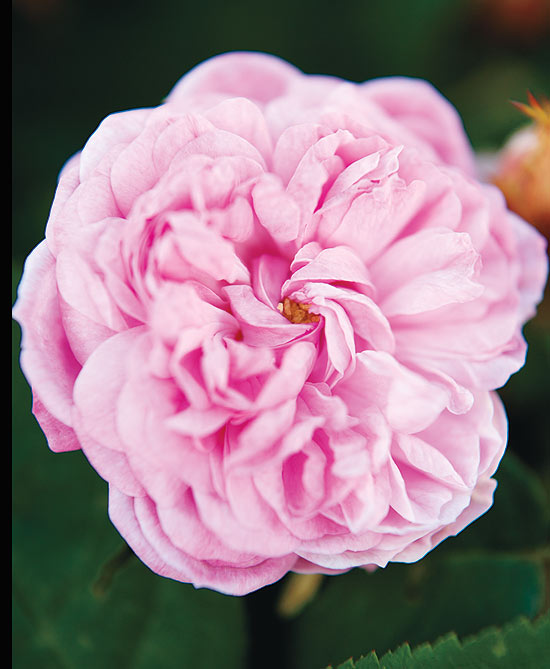
One of the oldest flowers in history, a staple of perfumers and known for its therapeutic properties, the damask rose is withering in the city and surrounding fields that gave it its name.
Farmer Jamal Abbas looks out over land in El-Mrah, some 60 kilometres (35 miles) northeast of the capital of a country ripped asunder by war for five years.
DC refuses to open Azakhel Botanical Garden
"The damask rose is dying," he says in the Nabek area village known for growing the 30-petalled flower, but where cultivated land has decreased by more than half.
The tradition of picking the crop has also faded as entire families have fled the fighting between regime forces and rebel groups.
War prevented access to the rose fields for a time and forced the cancellation of the annual rose festival, depriving El-Mrah of its main source of income.
Rebels were routed from the area in 2014, and on Sunday the festival was staged again, despite the production of damask roses at an all-time low.
"We went from 80 tonnes in 2010 to 20 tonnes this year because of the war, in addition to a drought," says another farmer, Hamza Bitar.
Now aged 43, Bitar says he "learned to walk in these fields".
Before the war erupted in 2011, "Lebanese merchants came to buy rose petals by the tens of tonnes for export to Europe," he says.
And "French perfumers distilled the dried petals to produce essential oil."
Writ petition: Nowshera DC ordered to open botanical garden
Exported to Europe for centuries since the time of the Crusades, this ancient rose is also cultivated in countries including France, Morocco, Iran and Turkey.
Thanks to its heady, rich and smooth scent, the damask rose -- it flowers naturally in May but can also be grown throughout the year -- is used to produce essential oils and cosmetics.
Experts swear by its therapeutic properties in fighting infection and as a relaxant, and rose water is used across the Middle East both as a refreshing drink, in Oriental sweets such as Turkish delight, to scent mosques and even to bestow luck at weddings.
It features in Western literature and poetry, notably that of William Shakespeare who died 400 years ago last month.
The Bard writes in Sonnet 130, a parody of a conventional love poem addressed to a less than blooming mistress: "I have seen roses damask'd, red and white, But no such roses see I in her cheeks."
In and around Damascus and its eponymous province, the rose used to adorn gardens, balconies and roadsides, a symbol for residents of Syria's capital.
But the decline in production and care make its presence these days more fleeting.
For both farmers and traders, the decline of the damask rose is also a symbol of a people's agony and a country wracked by a conflict that has killed more than 270,000 people and created millions of refugees.
Abu Bilal, 52, had a distillery in Ain Tarma in the Eastern Ghouta area near Damascus where he made rose oil, but that is now a rebel stronghold. War closed him down in 2011.
‘Soon Valley to become tourist destination’
"Douma used to smell of roses," he says of the besieged main town in Eastern Ghouta. "Now it reeks of gunpowder, they tell me."
These days Abu Bilal works in a souk at a perfumery in the Old Town of Damascus.
According to merchants in the souk where there used to be eight distilleries of rose oil, of which just two remain, it takes three tonnes of dried rose petals to make a kilo (two pounds) of essential oil.
"Today there are barely 250 grams (half a pound) of oil available to buy in the whole market," he says.
Despite also being cultivated elsewhere, the rose "from Damascus is unique because its smell is heady, its quality is better and it produces more oil," says Abu Bilal.
"The companies (pharmaceutical and cosmetic) and our customers in the Gulf like to buy the original -- it's a source of pride for them."
Back in El Mrah, octogenarian Amin Bitar has spent his entire life cultivating the damask rose.
"It's not just a business relationship we have with the flower, it's part of the family," he says sadly.
For him, the damask rose "will not come back to life until this war is over".




1734780406-0/Untitled-(11)1734780406-0-165x106.webp)



1734782942-0/Untitled-design-(24)1734782942-0-270x192.webp)
1734770488-0/Untitled-design-(3)1734770488-0-270x192.webp)
1734242367-0/Copy-of-Untitled-(4)1734242367-0-270x192.webp)




1734587529-0/Express-Tribune-(1)1734587529-0-270x192.webp)







COMMENTS
Comments are moderated and generally will be posted if they are on-topic and not abusive.
For more information, please see our Comments FAQ